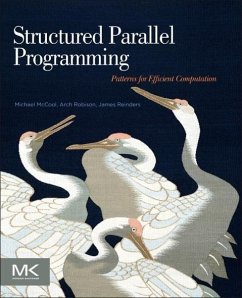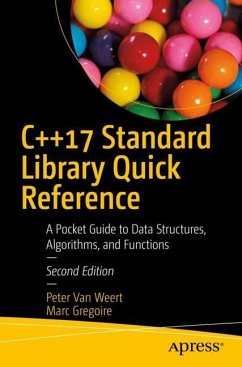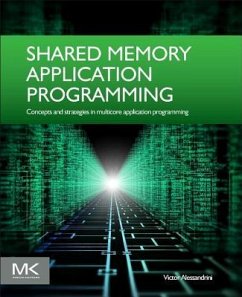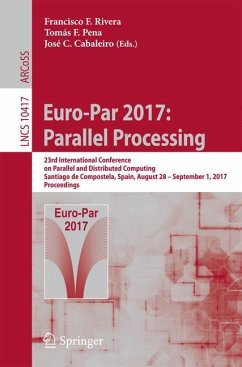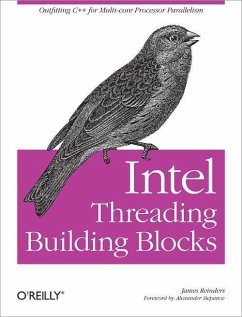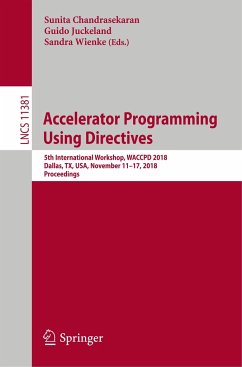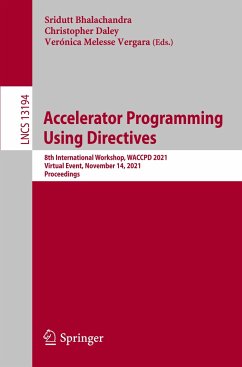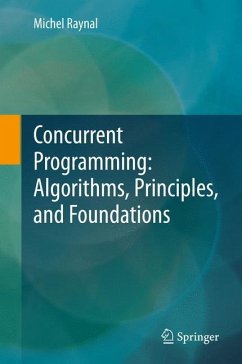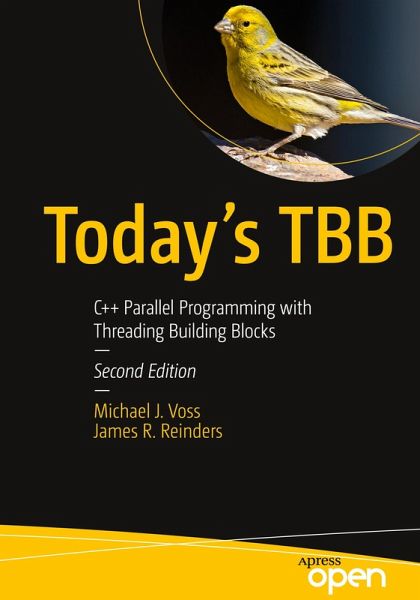
Today's TBB
C++ Parallel Programming with Threading Building Blocks
Versandkostenfrei!
Versandfertig in 6-10 Tagen
31,99 €
inkl. MwSt.

PAYBACK Punkte
16 °P sammeln!
This open-access book serves as a comprehensive guide for C++ programmers looking to master Threading Building Blocks (TBB). Authored by two experts in TBB and parallel programming, the book distills decades of collective experience in developing and teaching parallel programming concepts, presenting insights in a clear and accessible manner.Today s TBB starts with foundational principles, explaining key concepts and terminology used in parallel programming. It then introduces the major components of TBB including parallel algorithms, flow graphs, and task groups that help you fully leverage t...
This open-access book serves as a comprehensive guide for C++ programmers looking to master Threading Building Blocks (TBB). Authored by two experts in TBB and parallel programming, the book distills decades of collective experience in developing and teaching parallel programming concepts, presenting insights in a clear and accessible manner.
Today s TBB starts with foundational principles, explaining key concepts and terminology used in parallel programming. It then introduces the major components of TBB including parallel algorithms, flow graphs, and task groups that help you fully leverage the power of multicore systems. The book emphasizes TBB's higher-level parallelism capabilities, which facilitate the creation of portable, scalable applications for modern CPUs. Key topics, including memory management in parallel contexts and effective synchronization for data structures, are well explored, ensuring a comprehensive understanding of these critical concepts.
Later chapters delve into advanced topics including cancellation, exception handling, composability, performance tuning, and transitioning legacy code from older versions of TBB to Today s TBB.
For nearly two decades, TBB has been invaluable to programmers, and this book leverages the latest advancements in C++ alongside TBB to enhance your parallel programming capabilities.
TBB excels in unlocking the performance of code that is not well-suited for accelerators, making it an essential tool in the realm of parallel computing. If you work with technologies like CUDA, SYCL, or OpenCL for accelerated computing, mastering TBB will also enable you to orchestrate parallelism effectively on the host CPU, optimizing performance in the face of Amdahl s Law.
What You'll Learn
Create Scalable Code: Use TBB for portable, simple, and efficient programming.Parallelization Strategies: Implement best practices for intensive tasks.High-Performance Applications: Develop scalable parallel programs.Modern C++ Compatibility: Apply TBB with C++17 and later.Code Migration: Update legacy TBB code to leverage C++17 and Today s TBB.Think Parallel: Orchestrate parallelism in the entire computer system to your advantage.
Who This Book Is For
C++ programmers eager to harness the power of parallelism on multicore systems. Today s TBB is accessible to those with limited experience, with C++ or parallelism, providing clear guidance on best practices and techniques. Experienced programmers will find valuable insights for refining their skills, addressing advanced topics such as cancellation, exception handling, composability, and performance tuning. No prior experience in parallel programming or multicore processors is necessary; however, those with some background will discover even more depth and value throughout the book.
Today s TBB starts with foundational principles, explaining key concepts and terminology used in parallel programming. It then introduces the major components of TBB including parallel algorithms, flow graphs, and task groups that help you fully leverage the power of multicore systems. The book emphasizes TBB's higher-level parallelism capabilities, which facilitate the creation of portable, scalable applications for modern CPUs. Key topics, including memory management in parallel contexts and effective synchronization for data structures, are well explored, ensuring a comprehensive understanding of these critical concepts.
Later chapters delve into advanced topics including cancellation, exception handling, composability, performance tuning, and transitioning legacy code from older versions of TBB to Today s TBB.
For nearly two decades, TBB has been invaluable to programmers, and this book leverages the latest advancements in C++ alongside TBB to enhance your parallel programming capabilities.
TBB excels in unlocking the performance of code that is not well-suited for accelerators, making it an essential tool in the realm of parallel computing. If you work with technologies like CUDA, SYCL, or OpenCL for accelerated computing, mastering TBB will also enable you to orchestrate parallelism effectively on the host CPU, optimizing performance in the face of Amdahl s Law.
What You'll Learn
Create Scalable Code: Use TBB for portable, simple, and efficient programming.Parallelization Strategies: Implement best practices for intensive tasks.High-Performance Applications: Develop scalable parallel programs.Modern C++ Compatibility: Apply TBB with C++17 and later.Code Migration: Update legacy TBB code to leverage C++17 and Today s TBB.Think Parallel: Orchestrate parallelism in the entire computer system to your advantage.
Who This Book Is For
C++ programmers eager to harness the power of parallelism on multicore systems. Today s TBB is accessible to those with limited experience, with C++ or parallelism, providing clear guidance on best practices and techniques. Experienced programmers will find valuable insights for refining their skills, addressing advanced topics such as cancellation, exception handling, composability, and performance tuning. No prior experience in parallel programming or multicore processors is necessary; however, those with some background will discover even more depth and value throughout the book.





